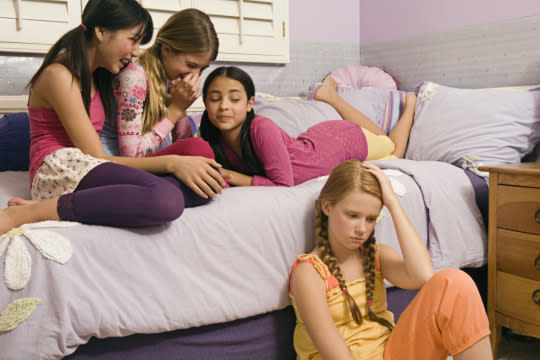5 Ways to Keep Your Daughter Away From Toxic Friends

Parents are more aware than ever of the relational aggression that is often a part of female friendships and how detrimental it can be to girls’ self-esteem. Laura Choate, a professor at Louisiana State University and author of Swimming Upstream: Parenting Girls for Resilience in a Toxic Culture, in stores Monday, defines toxic friendships as relationships in which a girl cannot be her truest, authentic self. “Does she have to pretend to be someone she’s not to please the friend? Do friends build her up or cause her to question herself?” These are questions to ponder, Choate tells Yahoo Parenting, in order to identify a toxic friend in your own child’s life. Here’s more advice on how to help girls steer clear of these painful relationships.
Help her define true friendship (and model it)
“Make a list together of what your daughter is looking for in a good friend,” suggests Choate. “Then ask her if her friends have those qualities. If they don’t, talk about what’s drawing her to those relationships, and if there’s a warning flag, pay attention to it.” Your daughter might also consider whether she demonstrates those qualities herself — is she a good friend to others by being loyal, kind, and consistent? Defining friendship together this way can help her identify potentially toxic issues. And mothers, who Choate notes have a huge influence on their kids in this realm, should model strong female friendships as well by building up their girlfriends and sharing those positive relationships with their daughters.
STORY: 8 Ways to Raise Joyful Children in a Stressful World
Help her handle gossip
Gossiping is natural, but it causes a lot of hurt. Choate recommends asking your daughter to consider these questions when she’s tempted to gossip: Who benefits if I repeat this info? Who will be hurt? How would I feel if this were being said about me? Would I repeat this if the person it’s about were right in front of me? “Usually the answers lead to not sharing the information,” says Choate. And if your daughter hears gossip among her friends, help her to speak up and squash it. “Studies have found that the first person who speaks after a rumor is mentioned controls the direction of the conversation,” says Choate. “So if one person says, ‘I heard that girl is mean,’ and the first responder says, ‘I haven’t noticed that at all,’ it tends to diffuse the conversation and the gossip falls away.”
Make home a sanctuary
“No matter what’s going on at school or in the outside world, let your daughter know that home is a place of peace where she’s understood and fully accepted as she is,” says Choate. “Tell her that you know friendships are hard, and that you’re there to listen and provide support without judgment.” Choate notes that this also includes being mindful of the media you consume at home. “Reality shows and TV dramas often portray women and girls as competitors who can’t be trusted and may be nice to you one day and mean the next,” she says. “Make sure that’s not what your daughter is learning about friendship. Reinforce the positive examples she sees and discuss the negative ones.”
STORY: How Letting Teens Drink at Home Affects Them Later in Life
Cultivate assertiveness
“Girls are socialized to make other people happy,” says Choate, “but if your daughter is able to speak up and be honest with friends about her feelings, she will have much stronger relationships than if she stays silent and doesn’t rock the boat.” That means telling friends if she feels hurt or left out, and knowing that if the friends don’t respect her openness and honesty, it may be time to move on.
Support the “Girl in the Middle”
Rosalind Wiseman, author of Queen Bees and Wannabees, coined this term, and Choate says it’s extremely helpful. “A Girl in the Middle is someone who is confident enough to float between friendship circles,” she says. “She has a lot of friends and does a variety of things so she doesn’t spend time worrying about pleasing one group.” To help your daughter cultivate this confidence, make sure she has different outlets for finding and establishing friendships. “You don’t have to overschedule a million activities for your child, but a couple of groups outside of school can really help,” says Choate, who recommends community sports teams, neighborhood gatherings, and Girl Scout-type organizations as potential outlets. “If one friend in one group is causing her stress, but she has other sources of support, she won’t start thinking her life is going to fall apart.”
(Photo: Getty Images)
Please follow @YahooParenting on Facebook, Twitter, Instagram, and Pinterest. Have an interesting story to share about your family? Email us at YParenting (at) Yahoo.com.